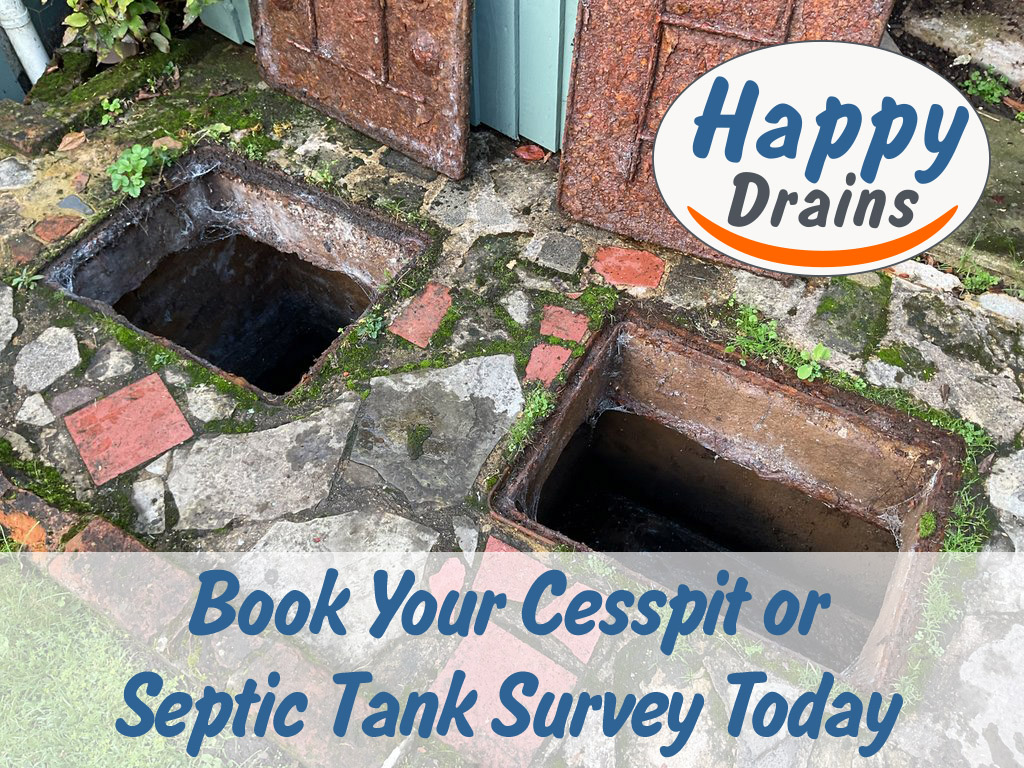Are You Affected by Septic Tank or Sewage Treatment Rules?
- Is your property served by a septic tank or a sewage treatment plant?
- Are you buying or selling a property with one of these systems?
- Has your mortgage lender or solicitor requested proof of compliance?
If so, you may be affected by the General Binding Rules (GBRs) for small sewage discharges. These regulations are a legal requirement in England and Wales and apply to most off-mains drainage systems.
Book Your Cesspit or Septic Tank Survey Today
Ensure your property complies with current regulations and avoid costly surprises during sales, purchases, or legal checks.
Contact Happy Drains today to schedule your off-mains drainage compliance inspection.
⚠️ Don’t wait for a solicitor or lender to flag a problem — act now to protect your investment.

What Are the Small Sewage Discharge General Binding Rules?
The General Binding Rules (GBRs) are part of the Environmental Permitting (England and Wales) Regulations and came into effect on 1 January 2015. They are designed to prevent pollution from domestic systems like septic tanks and sewage treatment plants.
Key Requirements:
Discharge Limits
You can discharge up to 2m³/day to the ground and 5m³/day to surface water without needing a permit.
Pollution
Your system must not cause pollution, odour, or nuisance. If it does, it must be fixed immediately.
Surface Water Ban
Since January 2015, septic tanks must not discharge directly to watercourses (like streams or ditches).
System Standards
Your system must meet British Standards (such as BS EN 12566) for design and performance.
Location Constraints
There are minimum distance requirements from buildings, watercourses, and boreholes for health and safety.
Maintenance
Your tank must be emptied regularly and maintained to ensure effective operation.
Permit Exemption
If you comply with all the rules, you don’t need an environmental permit.
Recent Changes (October 2023)
- Discharges cannot be shared if the total output exceeds threshold limits.
- New installations must have 50m separation from other drainage systems.
- A mains connection is mandatory if it’s reasonably possible.
Why Do You Need a Compliance Survey?
The only way to know if your off-mains drainage system is compliant is through a professional inspection. At Happy Drains, we provide expert compliance surveys that assess:
- What the system is (septic tank, treatment plant, etc.)
- Its condition, location and size
- Whether it is correctly installed and maintained
- How and where it discharges
- Any cross-connections with rainwater
You’ll receive a comprehensive report with clear recommendations and a quotation for any required remedial works to bring the system up to code.
What Happens If My System Is Not Compliant?
Failing to meet the GBRs can result in:
- Refusal of mortgage or delays in the property sale
- Enforcement action or fines from the Environment Agency
- Environmental damage or legal liability
Upgrading your system may include:
- Redirecting discharge to a suitable drainage field
- Installing a compliant sewage treatment plant
- Connecting to the mains (if feasible)
Frequently Asked Questions (FAQs)
Q: Is it a legal requirement to empty my septic tank regularly?
Yes. You must empty your tank “as often as necessary” to prevent overflow or pollution. For most households, this means at least once per year.
Q: Can I discharge my septic tank into a ditch or stream?
No. Since 1 January 2015, direct discharge to surface water is illegal for septic tanks. You must upgrade to a treatment plant or redirect to a drainage field.
Q: What’s the difference between a cesspit and a septic tank?
A cesspit is a sealed tank with no treatment or outflow — it must be emptied very frequently. A septic tank provides basic treatment and discharges effluent to a soakaway.
Q: What if I never empty my septic tank and it still seems to work?
Even if it appears functional, sludge builds up over time. You are still legally required to maintain and empty it to avoid pollution risks — and you must prove compliance if asked.
Q: Do the rules apply if I live in a remote rural area?
Yes. The General Binding Rules apply regardless of location. Rural properties are not exempt.
Q: How do I prove compliance when selling my property?
A compliance survey and maintenance records (such as tank emptying receipts) are the best way to show the system meets legal standards.
Book Your Cesspit or Septic Tank Survey Today
Ensure your property complies with current regulations and avoid costly surprises during sales, purchases, or legal checks.
Contact Happy Drains today to schedule your off-mains drainage compliance inspection.
⚠️ Don’t wait for a solicitor or lender to flag a problem — act now to protect your investment.




